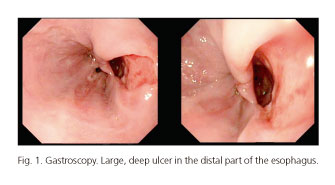My SciELO
Services on Demand
Journal
Article
Indicators
-
 Cited by SciELO
Cited by SciELO -
 Access statistics
Access statistics
Related links
-
 Cited by Google
Cited by Google -
 Similars in
SciELO
Similars in
SciELO -
 Similars in Google
Similars in Google
Share
Revista Española de Enfermedades Digestivas
Print version ISSN 1130-0108
Rev. esp. enferm. dig. vol.109 n.8 Madrid Aug. 2017
https://dx.doi.org/10.17235/reed.2017.5135/2017
LETTERS TO THE EDITOR
Idiopathic esophageal ulcer as an initial manifestation of HIV infection
Úlcera esofágica idiopática como manifestación inicial de infección por el VIH
Key words: Esophageal ulcers. HIV infection. Idiopathic esophageal ulcer. Antiretroviral therapy.
Palabras clave: Úlceras esofágicas. Infección por el VIH. Úlcera esofágica idiopática. Tratamiento antirretroviral.
Dear Editor,
An esophageal ulcer is a common complication in people affected by the acquired human immunodeficiency virus (HIV).
Case report
A male of 38 years of age attended the clinic due to dysphagia which had evolved over 2 months. A gastroscopy was performed showing a large, deep ulcer in the distal part of the esophagus. Biopsies were taken from the base and edges (Fig. 1). The histological study showed granulated tissue and necrotic-fibrinoid material with an ulcerous base without evidence of malignancy and no indication of CMV or HSV infection. A second gastroscopy was performed two weeks later and confirmed the persistence of the lesion. An immunohistochemical study and PCR for CMV-DNA and HSV-DNA was also negative. Serology for the two viruses also precluded an acute infection. As the patient was a homosexual, this led us to investigate the presence of the Human acquired immunodeficiency virus (HIV) and a positive result was obtained in two analyses (immunochemiluminescence). The lymphocyte population study was as follows; 206 CD4 (9% of the total). The patient started treatment with darunavir at 800mg and ritonavir at 100mg.
After one month of antiretroviral treatment, the improvement in the CD4 lymphocyte count was confirmed and a new gastroscopy showed that the esophageal ulcer had disappeared as well as mucosal healing.
Discussion
This case is peculiar, as the initial diagnosis of HIV infection was based on an idiopathic esophageal ulcer (1,2). Most infectious esophagitis in patients with HIV are related to the candida, CMV or HSV species. However, there is a subgroup of patients in which no specific agent is identified and they are labeled as idiopathic ulcers (3). In cases of an esophageal ulcer of unknown origin, the possibility of an associated HIV infection should be considered. As the antiretroviral treatment itself could lead to a favorable result (4,5).
Alicia Martín-Lagos-Maldonado1, Julio Guilarte-López-Mañas1 and Alberto Benavente-Fernández2
Departments of 1Digestive Diseases and 2Internal Medicine.
UGC of Internal Medicine, Specialist Medicine, and Palliative Care.
Hospital Público Comarcal de Baza. AGS Nordeste de Granada. Granada, Spain
References
1. Bonacini M, Young T, Laine L. The causes of esophageal symptoms in human immunodeficiency virus infection. A prospective study of 110 patients. Arch Intern Med 1991;151:1567-72. DOI: 10.1001/archinte.1991.00400080067012. [ Links ]
2. Rabeneck L, Popovic M, Gartner S, et al. Acute HIV infection presenting with painful swallowing and esophageal ulcers. JAMA 1990;263:2318-22. DOI: 10.1001/jama.1990.03440170040033. [ Links ]
3. Wilcox CM, Schwartz DA, Clark WS. Esophageal ulceration in human immunodeficiency virus infection. Causes, response to therapy, and long-term outcome. Ann Intern Med 1995;123:143-9. DOI: 10.7326/0003-4819-123-2-199507150-00010. [ Links ]
4. Hamada Y, Nagata N, Honda H, et al. Idiopathic oropharyngeal and esophageal ulcers related to HIV infection successfully treated with antiretroviral therapy alone. Intern Med 2013;52:393-5. DOI: 10.2169/internalmedicine.52.8709. [ Links ]
5. Nishijima T, Tsukada K, Nagata N, et al. Antiretroviral therapy alone resulted in successful resolution of large idiopathic esophageal ulcers in a patient with acute retroviral syndrome. AIDS 2011;25:1677-9. DOI: 10.1097/QAD.0b013e328349c. [ Links ]











 text in
text in 


